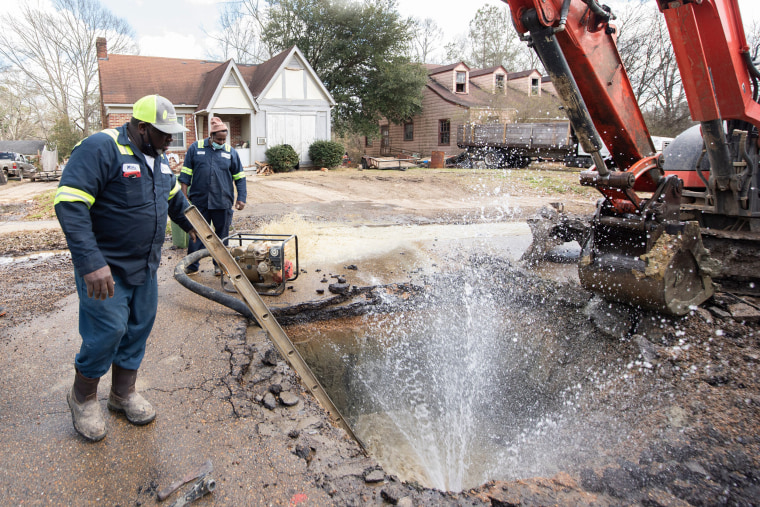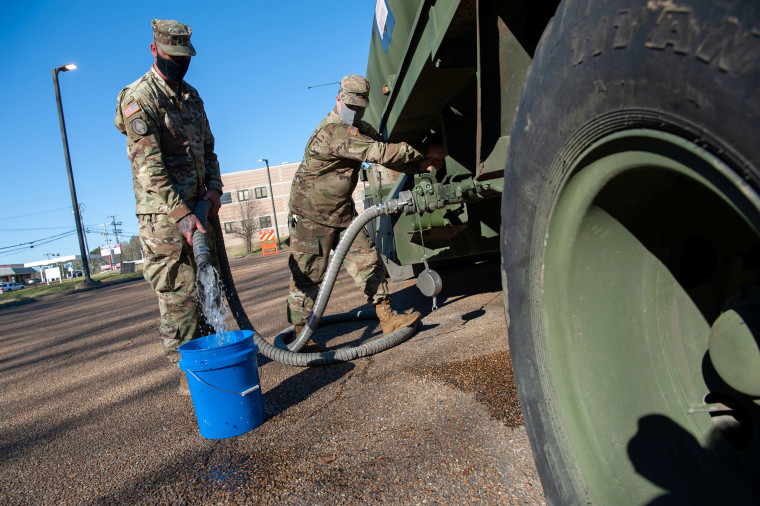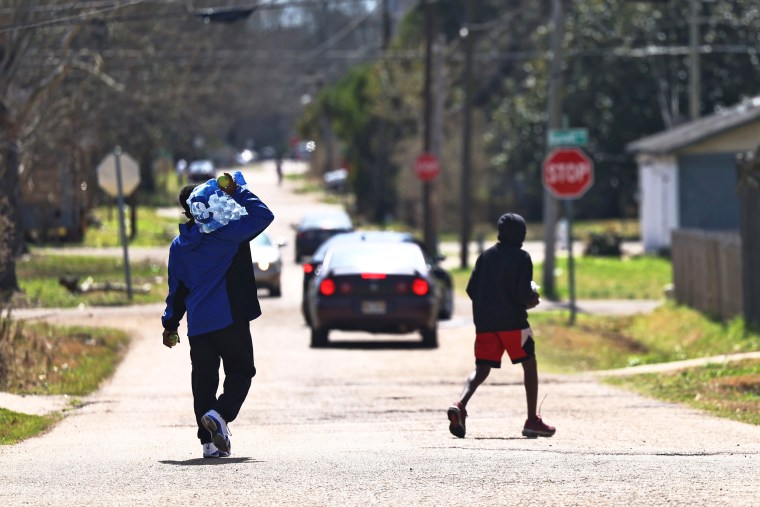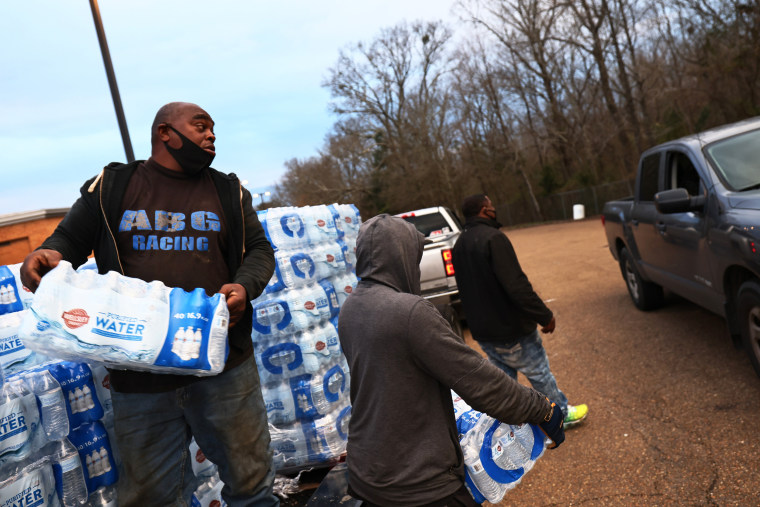JACKSON, Miss. — The power was out, the temperature was in the low 20s and the roads bordered on impassable when Vince Gordon lost water at his south Jackson home in mid-February.
His family hunkered down with a generator, and the reserve of water they’d bought in preparation for the winter storm. By the end of the week, the ice had thawed. But when they checked the faucet, nothing came out.
For much of the city, it stayed that way for three weeks. And although Jackson announced Friday that most of the city’s water service had been restored, the crisis isn’t over.
At the Global Connection Learning Center, a day care serving 59 children, there’s still tape over the sinks to make sure children don’t use them, as much of Jackson remains under a boil-water notice. Staff members wash the toddlers’ hands and the center's dishes with bottled water instead. Nancy Sylvester, the center’s director, takes bibs and cot covers to her home in nearby Clinton to launder them.
At the height of the crisis, at least 40,000 residents in Jackson and neighboring Byram were estimated to have lost water service. While locals are no longer melting snow or collecting rainwater in buckets to have the ability to flush toilets, officials have not yet been able to prove that most of the city’s water is safe to drink. For many residents, frequenting water giveaways has become a part of their daily routine.
Life these days is about “just getting water and trying to make it work,” said south Jackson resident Alonzo Mabry, who has been scouring the city for free bottled water for his 94-year-old mother, who is bedridden.
Officials hope to begin lifting the boil-water notice by next week, but challenges remain. Absent an overhaul of what Jackson Mayor Chokwe Lumumba has called “peanut brittle”-like infrastructure, and the hundreds of millions of dollars to make it happen, the threat of the next outage looms.
Do you have a story to share about aging infrastructure in the South? Contact us
Although previous cold snaps have caused water main breaks, locals say this year’s outage is one of the worst in recent history. Danyelle Holmes, a field director with the Poor People’s Campaign and a Jackson resident, spent much of the past month helping distribute water in the city. She’d seen commercials by international charities showing families and young children filling up buckets and jugs with water. Now this was happening at home.
Holmes is not surprised that the infrastructure in a city where some of the pipes predate the Great Depression “went sour.”

Jackson is a city with an estimated $2 billion infrastructure problem — the cost of overdue water and sewer overhauls — and a $300 million annual budget. Twenty-five percent of residents in Jackson live below the poverty line. The city’s median income is just below $39,000. Although it’s Mississippi’s largest city, Jackson, where 82 percent of residents are Black, has struggled. Decades of white flight have whittled down the city’s economic footing.
“All of this happened to individuals at no fault of their own and yet they have to suffer,” she said.
For years, the city has struggled to collect overdue water bills from residents, while locals have reported receiving astronomical bills of $1,000 or more. In 2014, voters approved an additional 1 percent sales tax to make improvements. That’s brought the city $13 million to $15 million a year for improvements, but it still falls short.
Jackson Public Works Director Charles Williams said Thursday that his top priority is making sure residents have safe running water again. But he’s also spent time lobbying for funding from the state that could help prevent future crises.
“We’re not done yet,” he said.
The city’s latest chapter in a long history of infrastructure woes started Feb. 15, when a winter storm pummeled Mississippi and much of the South.
In Jackson, critical machinery froze at the city’s water plant. A precipitous drop in water pressure followed, further taxing the city’s water supply as residents kept their faucets dripping in an attempt to prevent pipes from freezing. The gradual return of pressure as temperatures warmed up proved too much for Jackson’s system to handle. Nearly 100 confirmed water breaks in the city followed, creating another setback in efforts to restore water supply.
A coalition of grassroots groups formed a rapid response team to supply water to residents. Organizers also provided cash assistance to locals who had missed work because of the storm or struggled to replace groceries that spoiled when the electricity went out.
Natt Offiah, a volunteer for the effort, monitored the group’s hotline. One woman who called over several days for help was incredulous when she learned the group wasn’t part of a government-led response. Pipes had burst in her home and she was desperate for assistance to stay in a hotel. As the group worked to collect donations to put her up, she told Offiah she’d never heard of a state or federal agency using methods like Cash App to deliver relief funds. She asked if they were a scam.
“I thought this was the government. Do you know if the state is doing anything?” she asked Offiah.
Almost a week would pass before the National Guard arrived to distribute water.

“Right now, we all we got,” Offiah told her, recalling that “her mood changed from anger to frustration to a bit of shock. The disappointment was pointed toward the lack of state response.”
Bailey Martin, a spokeswoman for Mississippi Gov. Tate Reeves’ office, said the governor had fulfilled several requests made by Hinds County, where Jackson is located, including for water delivery. Reeves, a Republican, signed an executive order on Feb. 23 to deploy the National Guard once local officials made the request, Martin said. Members arrived with four tanker trucks the next day.
She added that Reeves "couldn't be more proud" of the work the National Guard and the state's emergency management agency have done over the past 13 months.
For more of NBC News' in-depth reporting, download the NBC News app
Before the recent storm, many residents say a deep freeze in 2018 was a warning shot. Frigid temperatures caused a streak of water main breaks, leaving some locals without water for the week. The event also shut down the city’s schools for several days. Many of the district’s campuses lacked enough water pressure to flush toilets or heat up buildings.
That same month, the city council signaled their support for potential litigation against a private company charged with upgrading the city's water billing system, resulting in an eventual settlement in 2020. Jackson received about $60 million in funds, but steep expenses remain. The past few weeks have further exposed the fragility of the city’s water system.
As crews worked to restore service, Lumumba and the city’s legislative delegation began lobbying top officials in the state for a reprieve. Lumumba drafted a letter to the state’s Republican leadership and the congressional delegation, requesting $47 million in aid.
Another option, introduced by state Rep. Chris Bell, D-Jackson, would allow the city to bring another tax increase before voters for repairs. But the legislation must pass both chambers and cross Reeves' desk before becoming law. As the April 4 end date of the legislative session approaches, it’s unclear if lawmakers will take action.
The city has submitted a damage assessment of $16 million in hopes of securing federal relief. Michelle Atoa, a spokeswoman for the mayor’s office, said officials anticipate sending a supplemental request as further costs are determined.

Williams expressed hope Thursday that funds from the latest Covid-19 relief package recently signed by President Joe Biden would trickle down to Jackson and provide a start.
In the meantime, some residents, like Holmes, aren’t waiting for a solution to be sketched out. Climate change that has pushed hotter summers and harsher winters in the region, she said, means the city’s system will be hit again. She’s already discussing with organizers how to prepare for the next one.
“We can never say, ‘we won’t see this day again,’” she said. “We know the next time we experience this, it will be worse.”

